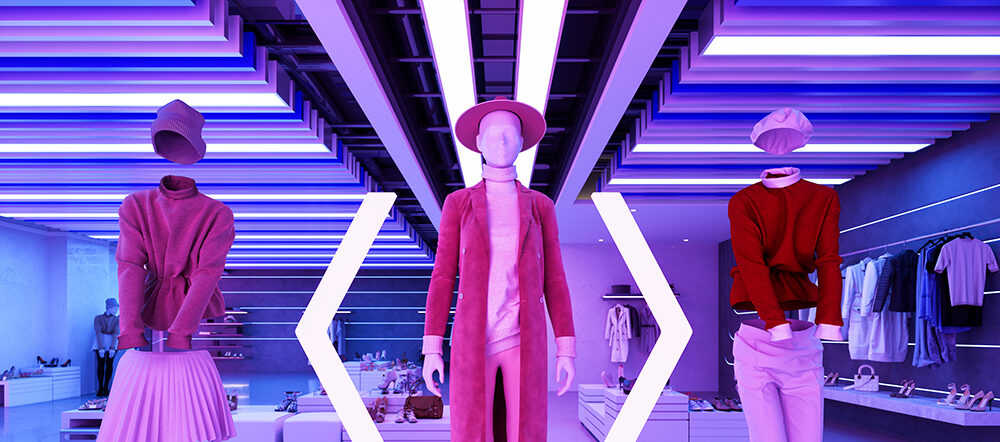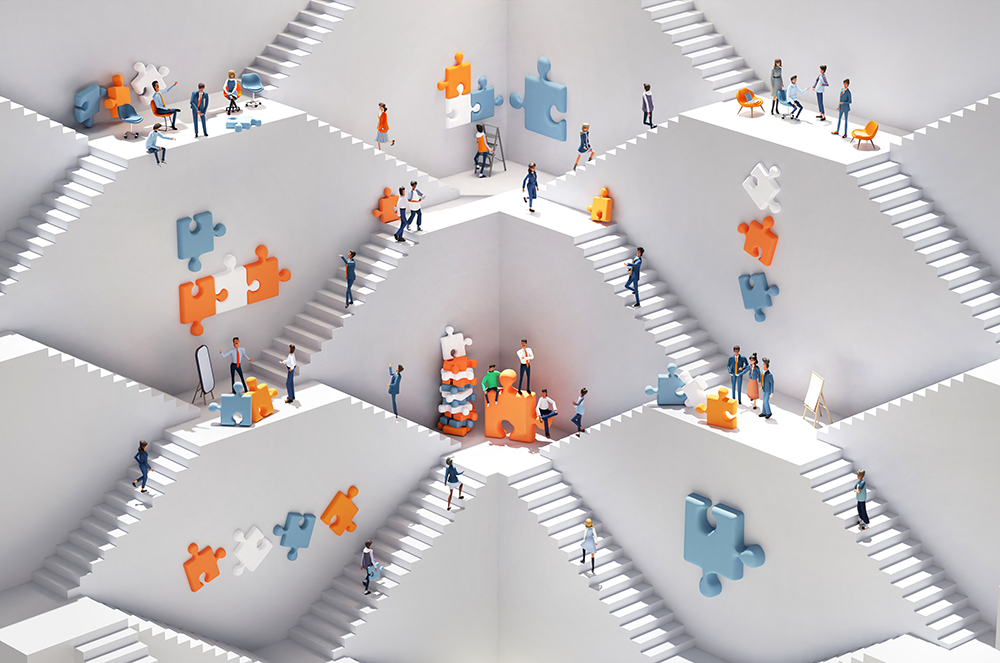According to studies by McKinsey, Deloitte, and IBM, an estimated 40–50% of organisations are now using Artificial Intelligence (AI) in at least one HR process – most commonly in recruitment, training, or through operational HR chatbots.
In the corporate world, the real question is no longer whether to use AI in HR, but how best to leverage technologies that are already reshaping the way we approach HR strategy, company culture, and our relationship with talent. Is it merely a technical advantage, or a new lens through which we lead the human side of the business?
For HR leaders, this presents both a challenge and an opportunity: how can AI be harnessed not only to streamline processes, but also to strengthen culture, deepen employee engagement, and elevate the people experience at work?
Louis Henry, Associate Partner within the HR Practice at Eton Bridge Partners, recently sat down with Alessia Gargano, Chief Human Resources Officer and seasoned leader in global luxury retail, to explore this balance. With a background that spans both marketing and HR at iconic names like LVMH, Coty, and L’Oréal, Alessia brings a distinct perspective on how AI is reshaping not only customer experiences, but company cultures and leadership itself.
Connecting brand, people, and performance with AI
What drew Alessia into the AI conversation wasn’t a fascination with the technology itself, but with what it could unlock: a new kind of organisational culture powered by data, emotional intelligence and strategic clarity.
Alessia’s career began in marketing and retail before she moved into HR leadership. This dual perspective has given her a unique lens to the way she views transformation: always connecting brand, people, and performance.
“I’m especially curious about how AI can help us reimagine the way we remodel organisations and connect with people,” Alessia says. “Not to replace the human, but to deepen it.”
The realisation that technology, when harnessed with empathy and strategic intent, could empower every level of an organisation shifted her focus toward AI’s potential in HR.
Over the past few months, Alessia has been exploring how this shift is playing out across the luxury retail ecosystem – in fashion, jewellery, hospitality, and B2C beauty – where AI is not only reshaping roles, but redefining how organisations think about skills, structure, and human potential.
From CRM to CX: What retail can teach HR about AI
Coming from the luxury retail world, Alessia offered a compelling comparison: “Retail isn’t just about sales anymore; it’s about emotional resonance.” The tools may be digital – AI-driven CRMs, clienteling apps, recommendation engines – but the goal is human connection.
That same logic, she says, can and should apply internally. “If we’re using data and AI to know our best clients inside and out, why wouldn’t we use it to understand and engage our best talent?”
She envisions a shift from “retention” to “resonance,” where companies aren’t just keeping people on payroll, but actively nurturing their growth, experience, and emotional connection to the organisation.
The future of retail (and HR) roles: Emotion meets data
A particularly powerful example from Alessia’s experience in luxury retail is the evolution of clienteling; once focused on transactions, it’s now about creating meaningful, emotional connections with customers, powered by data and empathy.
Luxury brands are beginning to introduce roles like “Clienteling Orchestrators” – individuals who harmonise marketing, digital, CRM, retail, and analytics to shape unified, resonant customer journeys. Alessia believes HR needs a similar transformation.
“We need HR leaders who act as Talent Experience Orchestrators – people who can weave together data, emotions and employee development with intention,” she says.
This is where AI becomes more than just automation. It becomes an enabler of culture.
The definition of a “great employee”, especially in frontline retail, is shifting. Traditional sales profiles are giving way to a new archetype, what Alessia calls “artisans of human connection.” Picture emotionally intelligent, culturally fluent, digitally agile professionals who can blend intuition with information. It’s not just about responding to customers or employees anymore, it’s about anticipating their needs, moods, and moments.
And this shift isn’t confined to retail. It has profound implications for HR, signalling a future where roles are redefined at the intersection of emotion and data, powered by AI and guided by human insight.
The four skills of the future
In the next 3 to 5 years, Alessia expects the gap to widen between those who only master human connection, and those who can also interpret data, adapt fast, and curate meaningful content.
In her view, four key skillsets are emerging as critical:
- Data fluency: Not just reading dashboards, but translating insights into action.
- Agility: The ability to evolve with new formats, tools, and expectations.
- Trend curation: Turning overwhelming information into relevant, emotional stories.
- Storytelling: Knowing how to connect emotionally, not just sell technically.
“In short, we’re moving toward a retail culture that is both deeply human and digitally fluent” says Alessia. “The future profile is not just a great salesperson. It’s a client advisor who can blend intuition and information, empathy and analytics – someone who feels what matters, and understands what works.”
So where is HR now and what needs to change?
Alessia is optimistic, but clear-eyed about where most HR functions currently stand with AI: early days.
“AI is still being used in isolated pockets, rather than as part of a cohesive, strategic journey,” she said. The real shift, she argues, comes when we stop thinking about tools and start thinking about transformation.
The opportunity lies in reimagining how teams work together – breaking down departmental walls and building around unified experiences. Whether it’s a customer journey or a career journey, AI needs orchestration, not isolation.
That means mastering data not just to observe, but to actively guide decisions – from performance management to cultural transformation – all in a truly human-centred way.
Of course, no transformation is without its pitfalls. For Alessia, two stand out:
1 – Thinking AI will eliminate jobs outright. It won’t – but it will evolve them. Some roles may disappear, yes, but many more will be born. Often, these will be hybrid, cross-functional, and more strategic than before.
2 – Expecting quick wins. Effective AI integration is evolutionary – you need to be prepared to transform culture, not just process.
Redefining talent in the AI era
AI is no longer just an HR experiment, it’s a business imperative demanding executive attention and investment.
Here’s what senior leaders should prioritise:
- Champion cross-functional orchestration: Break down silos with roles that integrate data, technology, and people strategies.
- Invest in data fluency and AI literacy: Equip HR and leaders to interpret and act on AI-driven insights.
- Focus on human- centred design: Use AI to deepen empathy, storytelling, and authentic connection, not replace it.
- Adopt an evolutionary mindset: View AI adoption as a cultural transformation, not an instant fix.
The organisations that embrace this balanced, strategic approach will unlock AI’s full potential — creating workplaces where technology and humanity thrive together.
A vision for human-centred, AI-augmented HR
So what does the ideal future look like? Alessia’s vision is powerful: a world where AI and HR work together to support people in real time, at scale, and with empathy.
She imagines AI-enhanced tools that not only help streamline operations, but offer deeper, more nuanced understandings of people, culture, and context. “AI can become a strategic partner,” she says, “not to make decisions for us, but to make better decisions with us.”
Her greatest hope is that HR leaders use this moment not to mechanise HR, but to amplify our ability to lead with authenticity and compassion.
Because in the end, the most powerful thing AI can do for HR… is help us be even more people centric.
Thank you to Alessia for sharing your insights with us. Get in touch to continue the conversation.
Related content
Keep in touch
We’d love to stay in touch, please register to receive topical insights and exclusive event invitations.
Subscribe to our mailing list







